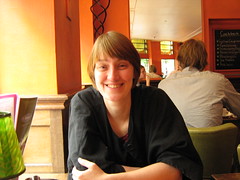So I talked to Erna quite a bit about gender stuff, since she actually has worked in that area for some time and she has reflected pretty thoroughly on her own experiences and observations. For one thing, she finds that she does have to prove her technological expertise more often than male teachers, and when she observes the teachers she trains she sees the same thing. In a class on computer use, women teachers are still more likely to be asked “test” questions than men, which suggests that though men and women may use computers for daily tasks in the same ways, and may be aware that they use them in the same ways, when people talk or think about being “experienced with computers,” they tend to use a narrow definition that depends on actual programming or other creation, rather than just use, and that men are still perceived as being more competent.
Also, Erna made a really good point in saying that she defined her own level of experience differently in different settings. Among her colleagues in Gender Studies, who are not so focused on tech, Erna describes herself as very experienced, but among people who program a lot, she describes herself as less so. So I think we need to look more closely at what standard people are using when asked to either describe their own practice or to evaluate others.
She also made an interesting comment about relationships and careers; as I said in part 1 of the interview, she mentioned herself still feeling like she had to have serious reasons to use tech, not just enjoying the playful aspect and that this was part of an old, embedded gender stereotype. She also later said that it was easier for lesbians to escape that dynamic because between two women (and I assume his would hold for gay men) choosing to work or not did not instantly force you into some stance in relation to traditional roles. Oddly, in a completely different context, a gay friend of mine here in the US recently said the same. So that may be a real issue, but hard to get at since if self-reporting about tech use is unreliable, I would guess that self-reporting about partner’s attitudes or relationship issues connected to work with tech might be even less so! And I’d really prefer to avoid using tiny spy-cams.
Erna in particular found that ICTs were important to her because she doesn’t like F2F communication so much. She claimed that she simply would not talk to people or stay as connected to them without email, chat applications, and Skype. This went really counter to the assumption most people seemed to make that connecting, speaking, or performing live was always better.
Finally, continuing the theme of socializing, she felt that while New Media as a field was more cooperative than some, it was not very cohesive, compared to E-Learning, for example. What I start to notice is that the artists I speak with find it quite cooperative while the academics do not, which suggests again another case where people are using different baseline criteria. Really a great interview in the way it helps me to start seeing larger patterns and figuring out which questions I need to ask next.
